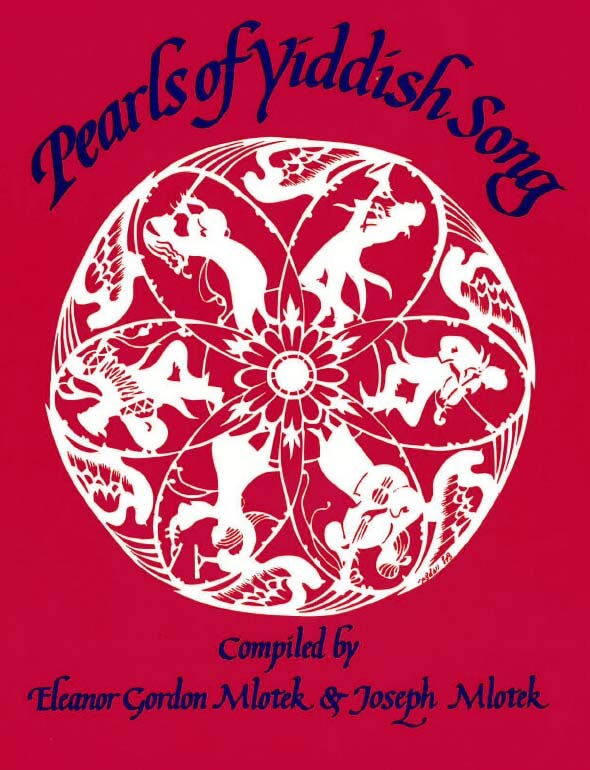Transcribed by compilers from a recording by Cantor Yossele Rosenblatt from his album Songs of My People. According to Yossele Rosenblatt, The Story of His Life as Told by His Son, Rosenblatt sang this song in the home of Chief Rabbi Kook in Palestine before he died in 1933.
The song was also sung during the Holocaust as reported by Eliezer Berkovitz in With God in Hell:
The Germans came to Lublin to set up a “Jewish area” and ordered the chairman of the Judenrat to assemble the Jewish population in an open field outside the city for a “general parade.” As the Jews presented themselves at the appointed time, the German commander ordered them to sing a gay and happy Hassidic tune. The crowd was fearful and confused, but one hesitant voice started singing the moving song: “Lomir zikh iberbetn, ovinu shebashomayim” — “Let us be friends again, Our Father in Heaven.” The crowd remained unresponsive. The German soldiers threw themselves with murderous blows upon the Jews who would not obey their command. Suddenly, a voice broke from among the crowd singing the same tune with might and joy, but with the words now changed to: “Mir veln zey iberlebn, ovinu shebashomayim — We shall outlive them, Our Father in Heaven.” The song gripped the crowd. They sang it with enthusiasm and danced to it ecstatically. It became for them the hymn of Jewish eternity. The Germans, bewildered and at a loss, started shouting: “Stop it! Stop it!” Did they sense that it was the song of their doom?”

Let’s make up, Our Father in Heaven.
Let’s make up, fulfill Your promise.
Refrain:
Because You have promised to reveal miracles and wonders just as in the past.
Enough persecution and chasing. Liberate Your nation Israel.
Let’s make up.
Remember our ancestry.
Let’s make up and don’t permit any more violence against us.
Let’s make up.
May Your Divine Presence rest upon us and may our enemies expire from envy.
Let’s make up, Our Father in Heaven.
Let’s make up, fulfill Your promise. Next year in Jerusalem.
Lomir zikh, lomir zikh iberbetn, iberbetn,
Ovinu shebashomayim,
Lomir zikh iberbetn,
Zay dayne verter mekayim.
Refrain:
Lomir zikh iberbetn,
Ovinu shebashomayim,
Lomlr zikh lberbetn,
Zay dayne verter mekayim.
Lomir zikh iberbetn,
Lomir zikh iberbetn,
Zay shoyn dayne verter mekayim.
Vayl nisim venifloes
Hostu dokh tsugezogt
Tsu vayzn undz azoy vi a mol,
Genug shoyn, genug shoyn
Geplogt un geyogt,
Un bafray dayn folk yisroel.
Lomir zikh, lomir zikh, iberbetn, iberbetn,
Dermon zikh, dermon zikh, in undzer yikhes;
Lomir zikh iberbetn,
Loz nit oyf undz mer keyn retsikhes.
Lomir zikh, lomir zikh, iberbetn, iberbetn,
Zol shoyn oyf undz ruen dayn shkhine,
Lomir zikh iberbetn,
Zoln di sonim oysgeyn far kine.
Lomir zikh iberbetn
Ovinu shebashomayim,
Lomir zikh iberbetn,
Zay dayne verter mekayim.
Leshone habo birusholayim!
לאָמיר זיך, לאָמיר זיך, איבערבעטן, איבערבעטן,
אָבֿינו שבשמים,
לאָמיר זיך איבערבעטן,
זײַ דײַנע װערטער מקײם.
רעפֿרײן:
לאָמיר זיך איבערבעטן,
אָבֿינו שבשמים,
לאָמיר זיך איבערבעטן,
זײַ דײַנע װערטער מקײם.
לאָמיר זיך איבערבעטן,
לאָמיר זיך איבערבעטן,
זײַ שױן דײַנע װערטער מקײם.
װײַל ניסים־ונפֿלאָות
האָסטו דאָך צוגעזאָגט
צו װײַזן אונדז אַזױ װי אַ מאָל
גענוג שױן, גענוג שױן
געפּלאָגט און געיאָגט,
און באַפֿרײַ דײַן פֿאָלק ישׂראל.
לאָמיר זיך, לאָמיר זיך, איבערבעטן, איבערבעטן,
דערמאָן זיך, דערמאָן זיך, אין אונדזער ייִחוס;
לאָמיר זיך איבערבעטן,
לאָז ניט אױף אונדז מער קײן רציחות.
לאָמיר זיך, לאָמיר זיך, איבערבעטן, איבערבעטן,
זאָל שױן אױף אונדז רוען דײַן שכינה,
לאָמיר זיך איבערבעטן,
זאָלן די שׂונאים אױסגײן פֿאַר קינאה.
לאָמיר זיך איבערבעטן
אָבֿינו שבשמים,
לאָמיר זיך איבערבעטן,
זײַ דײַנע װערטער מקײם
לשנה הבאה בירושלים!
Song Title: Lomir Zikh Iberbetn, Ovinu Shebashomayim

First published in 1988 as Pearls of Yiddish Song: Favorite Folk, Art and Theatre Songs, this anthology contains 115 songs. Some material had never been published, while others, included in rare song collections or sheet music, were largely inaccessible. The songs presented reflect Jewish life in Eastern Europe and the United States and depict childhood, love, family celebrations, poverty, work and struggle. There are also songs from the Hasidic and Maskilic movements, songs of Zion and of America, as well as songs from the Yiddish theater.
The title of this anthology derives from the weekly two-page feature column “Pearls of Yiddish Poetry,” which the compilers Yosl and Chana Mlotek initiated in 1970 in the Yiddish newspaper Der Forvertz (the Yiddish Daily Forward). Hundreds of readers from around the world — including authors, composers, singers, actors — became co-participants in this collective folk project and recalled melodies, lines, fragments, stanzas and their variants of songs, poems, and plays which they had heard in their youth. At first, readers sent in only written material. Later, they also taped songs on cassettes, many of whose melodies had, until then, never been recorded. They also identified and supplied missing information regarding lyricists, poets, and composers and described the circumstances surrounding the songs’ origins, their dissemination, diffusion and impact.